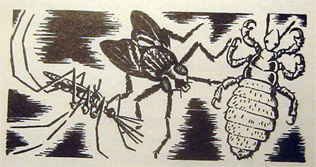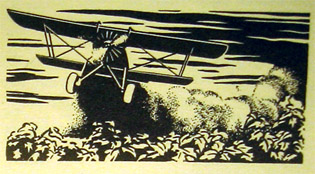Kablammo!
Guiding light, shed magic power from above! Spell Absorb!
GEHA ning keha
August 2, 2006It’s a good thing I finally got my health insurance card, since this promises to be the kind of weekend where I might end up needing it.
Solid state, 2
August 1, 2006I’m well on my way to becoming everything I’ve always hated. I’ve got some vinyl records, I’ve got a turntable that spins and is connected to an amplifier which is driving some speakers…. So as soon as I actually get a needle I’ll be ready to progress to the next level of being an asshole audiophile. I imagine that’s something like Bulbasaur evolving into Ivysaur or something.
Which poses the question, why in God’s name is the wikipedia entry for “Bulbasaur” a good 25% longer than the one for “Iran-Contra Affair“? For fuck’s sake.
Solid state
July 31, 2006I believe I may have gotten the turntable to work, so now all I need is some records so I can make sure.
Kabanoss
July 23, 2006Last night marked the first time since moving here that I’ve stumbled home drunk in the wee hours of the morning. I didn’t mind the interminable subway “Metro” ride, or the 15-minute walk from the station back to my apartment, because I was looking forward to getting a hot dog. I spent a year walking past a Statoil whenever I went anywhere (or came back), and I can say with confidence that Statoil’s hot dogs are incomparable; they’re veritable kings in the world of drunk-snacks.
There’s a 7-Eleven on the way to the Metro station, and of course it has one of those rather horrifying grease-coated cooker-thingies that’s usually bedecked with an array of tubular meats slowly rotating in their juices. But they didn’t have any, the fuckers. 3 in the morning on a Saturday night, and they were out of hot dogs? Come on.
I had to fall back to my standby option, the can of sour-cream-and-onion Pringles. Not as good as a hot dog, of course, but I’d forgotten how much more of the flavor-dust stuff they put on Pringles in America. European Pringles barely have any flavoring by comparison.
Peloton
July 22, 2006The margins of victory in long races can be sickeningly slim. In the 1987 Tour de France, for example, the difference between the first and second place finishers was 40 seconds. Mind you, the winning time was over 115 hours. That means the runner-up was, overall, slower than the victor by only 0.0096%, or one part in around 10400. That’s all it takes to become the first loser.
Anyway, Floyd Landis’s agent should get a bonus for the wonderful PR job Floyd has gotten. Sure, it’s nice for him that he seems poised to win the Tour, but I knew his name before the race even started! Goddamn feel-good puff pieces. (Style section, I’m looking at you.) I hope the endorsement deals he’s sure to get don’t conflict too badly with his Mennonite upbringing.
Finally, it’s interesting that “peloton“, a French loanword used in cycling, is also a word in Finnish, where it has a completely different meaning. But the Finnish meaning, dauntless or fearless, could also, it seems, be applied to the peloton.
15 Things: Redux
July 19, 2006Around seven months ago I participated in a blog-meme that I saw in this blog post right here the day before and decided to emulate. Two days later, “Brian” made a meta-meme post, which included among other things a shitload of links to instances of the meme that had popped up in the three weeks since some guy initially came up with it. My blog was among those linked to.
I bring this up now because today I found out I’d had a visitor linked to from “Brian’s” blog. In the seven months that link has (presumably) been there in his blog post, nobody had (apparently) clicked it! Also, it seems that’s the only link to here from a blog, ever. I don’t know whether to be amused or saddened by that, so I guess I’ll just remain indifferent.
However, there are a couple things I mentioned in that post that I’d like to revisit:
- I still have yet to finish any of those books. I did, however, recently finish the autobiography of a quadriplegic recovering alcoholic.
- As it turns out, the name of that book is The Daddy Decision, and it has a solid five-star user rating on Amazon. So it must be a great book!
D.D.T.
July 15, 2006War has always been a scourge. It not only destroys lives and property in a direct manner through shot, shell, bombs and fire but it often leaves in its wake death and disease in many other forms. Among these, typhus has probably been the greatest killer, and, malaria, another destroyer, offers a constant menace because of its prevalence in the  tropics. The cause of these threats to human life are the many insects that carry disease. In contrast to other great conflicts, we hear little about the loss of life due to pestilence in this war. Why is this?
tropics. The cause of these threats to human life are the many insects that carry disease. In contrast to other great conflicts, we hear little about the loss of life due to pestilence in this war. Why is this?
As in so many cases we won’t find the answer in one of today’s scientific discoveries. Here we shall have to go back more than seventy years and look over the shoulder of a chemical student, Othmar Zeidler, performing an experiment in Strasbourg. Young Zeidler on this particular day in 1874 produced a new chemical which he recorded in his notes as dichloro diphenyl trichloroethane—D.D.T. for short. But he saw no use for it, and the formula lay dormant in the records of the Chemical Society for sixty-five years.
In 1939 Swiss farmers were bothered with an unusual number of insects and since there was a great shortage of the usual insecticides the Geigy Chemical Company of Switzerland began to look around for substitutes. One of their young chemists, Paul Mueller, resurrected Zeidler’s old formula and tried out some of the D.D.T. The results were amazing. It took only the slightest contact with the chemical to kill the insects.
But the Swiss scientists found the usefulness of the new insecticide was not limited to just plant destroyers—it was equally effective against flies and lice. And when the War broke out and with it came the threat of typhus the Geigy Company’s American branch in New York turned over to our Army samples of the new insecticide which they had received from the parent company in Switzerland. In Orlando, Florida, government entomologists began to test the new material and all of the amazing claims were justified. A little D.D.T. powder dusted into the clothes safeguards the wearer  from typhus—for two weeks—and if the clothes were washed in a solution of the chemical the period was extended to three months!
from typhus—for two weeks—and if the clothes were washed in a solution of the chemical the period was extended to three months!
When sprayed over a stagnant pool it completely rid the water of mosquito larvae within 24 hours—an effective answer to malaria. Next it was tried on the walls of a barn literally infested with flies. As if by magic the flies disappeared and were not seen again for over a month. D.D.T. had passed all the tests and came through as the outstanding insect-killer. But now that its potency was proven there still remained the problem of getting it in large quantities.
The pioneer company to tackle the job in this country was the Cincinnati Chemical Works. It is one thing to produce something in the laboratory test tubes and another to manufacture it by the ton. But the difficulties were overcome, and in 1943, D.D.T. began to go to the fighting fronts. As other companies went into production the new chemical joined our armed forces on the battlefronts in ever-increasing quantities. No one who has ever fought the battle of disease will underestimate the importance of this most powerful weapon.
But insects are with us not only during a war—we wage a constant battle against them at all times. They destroy the farmer’s crops and spread disease among all mankind. In India alone malaria kills a million people a  year and in this country the common fly transmits disease to thousands. D.D.T. is our new weapon against the great loss caused annually by some eight thousand different kinds of insects. For home protection we can spray a screen and a fly won’t light on it for three months. It will kill more different kinds of insects using a smaller dose than any other chemical now known. Undoubtedly when the War is over it will be sold to the public for general use.
year and in this country the common fly transmits disease to thousands. D.D.T. is our new weapon against the great loss caused annually by some eight thousand different kinds of insects. For home protection we can spray a screen and a fly won’t light on it for three months. It will kill more different kinds of insects using a smaller dose than any other chemical now known. Undoubtedly when the War is over it will be sold to the public for general use.
Little did the young Zeidler know that day in Strasbourg that he was providing man with one of his most powerful weapons against disease-carrying insects. This is nearly always the case in the most important discoveries—the inventor rarely sees the ultimate application of his idea. For this reason we should encourage and treasure every new development—however unimportant it may seem at the time. Some day in an emergency it may turn out to be a thing of utmost importance.
On the weather
July 9, 2006How do I like it here, people ask me.
Everything is great—work is going well, there’s always stuff to do, etc.—but I’m of the firm opinion that people were not meant to live in this kind of heat and humidity. Yes, I’m sure there are worse places, but I’d complain about them as well.
And then, as if we hadn’t had enough rain recently, I was just greeted with this:
I can’t wait.
In other news, despite constantly complaining about the oppressive [atmospheric] conditions here, I remain too lazy to make use of the swimming pool in my apartment building. So it goes.
An open letter to Zidane
July 9, 2006Dude:
I can’t think of a better way to retire than to give Materazzi a devastating headbutt to the sternum and be ejected from the final game of the World Cup in overtime. That moment will be talked about for decades at the very least.
Happy America Day
July 4, 2006It’s 9:40pm on July 4th, and I’m just waiting for my laundry to finish so I can go to bed.
I’m not sure I even recognize myself.
Powered by WordPress with Hiperminimalist Theme design by Borja Fernandez.